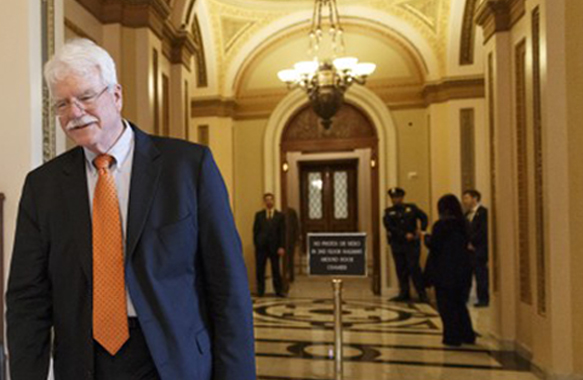Photograph; J. Scott Applewhite/AP – Rep. George Miller (D-Calif.), the ranking member of the House Committee on Education and the Workforce.
The word “Democrat” or “Republican” can be a flashpoint. The term “Tea Party” too ignites a flame and yet, at times, any of the three can be the one in the same, at least in respect to ideology. For any of these “control” can be the issue. Is it local, federal, or is it individual. Consider the subject of education. Who decides what is best for our children and who will be held accountable? Will it be a Democrat, a Republican, an Independent, or a Presidential appointee, or perhaps, it will be we, the people.
House Democrats to Duncan: States are backsliding on help for low achievers
By Lyndsey Layton E-mail the writer | Originally Published at Washington Post. February 12, 2014
House Democratic leaders are worried that Education Secretary Arne Duncan is not doing enough to hold states accountable for educating public school students who are low-income, minority, disabled or English-language learners.
Rep. George Miller (Calif.), the ranking Democrat on the House Committee on Education and the Workforce, and the chairs of the black, Asian and Hispanic caucuses wrote to Duncan on Tuesday, expressing concerns that several states are backsliding on their responsibilities to groups that are historically lowachieving.
The lawmakers said they were concerned that the states were not meeting their commitments, made under the Obama administration’s waiver program, to improving achievement for those disadvantaged groups.
Since 2011, the Education Department has been awarding waivers to states to excuse them from the more onerous requirements of No Child Left Behind, the 2002 federal education law.
The law sets conditions and requirements for every public school receiving federal funds to educate poor students and those with special needs. It defines academic progress and sets specific improvement strategies and sanctions for schools that do not measure up. One requirement, that all students must be proficient in math and reading by 2014, is now broadly seen as unrealistic.
The law expired in 2007, but Congress has been unable to find consensus on a new version.
With Congress stalled and complaints mounting from governors and school districts that they could not meet the demands of No Child Left Behind, Duncan began issuing waivers, freeing states from the requirements if they agreed to embrace certain education policy changes favored by Obama. To date, 42 states as well as the District of Columbia and Puerto Rico have received two-year waivers, and many are in the process of seeking a one-year renewal.
But Miller, the leading House Democrat on education issues and an author of No Child Left Behind, said Tuesday he is concerned that some states seeking waivers are trying to “game the system.”
“We see indicators that they’re reverting to old behaviors, where they tried to mask the performance of these kids and not be accountable for these kids, who are maybe just harder to educate,” Miller said. “The law doesn’t allow you to do that; the Constitution doesn’t allow you to do that.”
In their letter, Miller and the other members of Congress said that some states are doing such a weak job of meeting their commitments to educating poor and minority students that their civil rights are at risk.
In the two years that they’ve held waivers, some states have weakened policies regarding graduation rates for poor, minority and disabled students, so that high schools have less incentive to make sure those students graduate on time, Miller said. Louisiana, Indiana, Arizona, Colorado, Florida, Maryland, Massachusetts, Michigan and South Dakota are among those states, his staff said.
And just two states with waivers — Arizona and Michigan — have provided detailed plans for helping English learners and their teachers transition to new Common Core standards, a set of K-12 educational guidelines adopted by most of the country.
Dorie Nolt, a spokeswoman for the Education Department, said in a written statement that her agency is committed to making sure all students have equal access to public education. “The department shares the same commitment to protecting and promoting equity for students,” she wrote.
The waivers are designed “to provide educators with freedom from specific requirements of the No Child Left Behind Act in exchange for rigorous and comprehensive plans designed to improve educational outcomes for all students, close achievement gaps, increase equity and improve the quality of instruction in the classroom,” Nolt said.
But Miller said he was unsure about whether the Obama administration is exerting the proper amount of oversight.
“I’m concerned about the thoroughness of review of these waivers and whether or not we’ll be able to tell if these states are making progress on having kids perform at grade level,” he said. “We want to tell them ahead of time that we take this review very, very seriously. They have to take the time. They can’t just be a rubber stamp.”












Leave A Comment